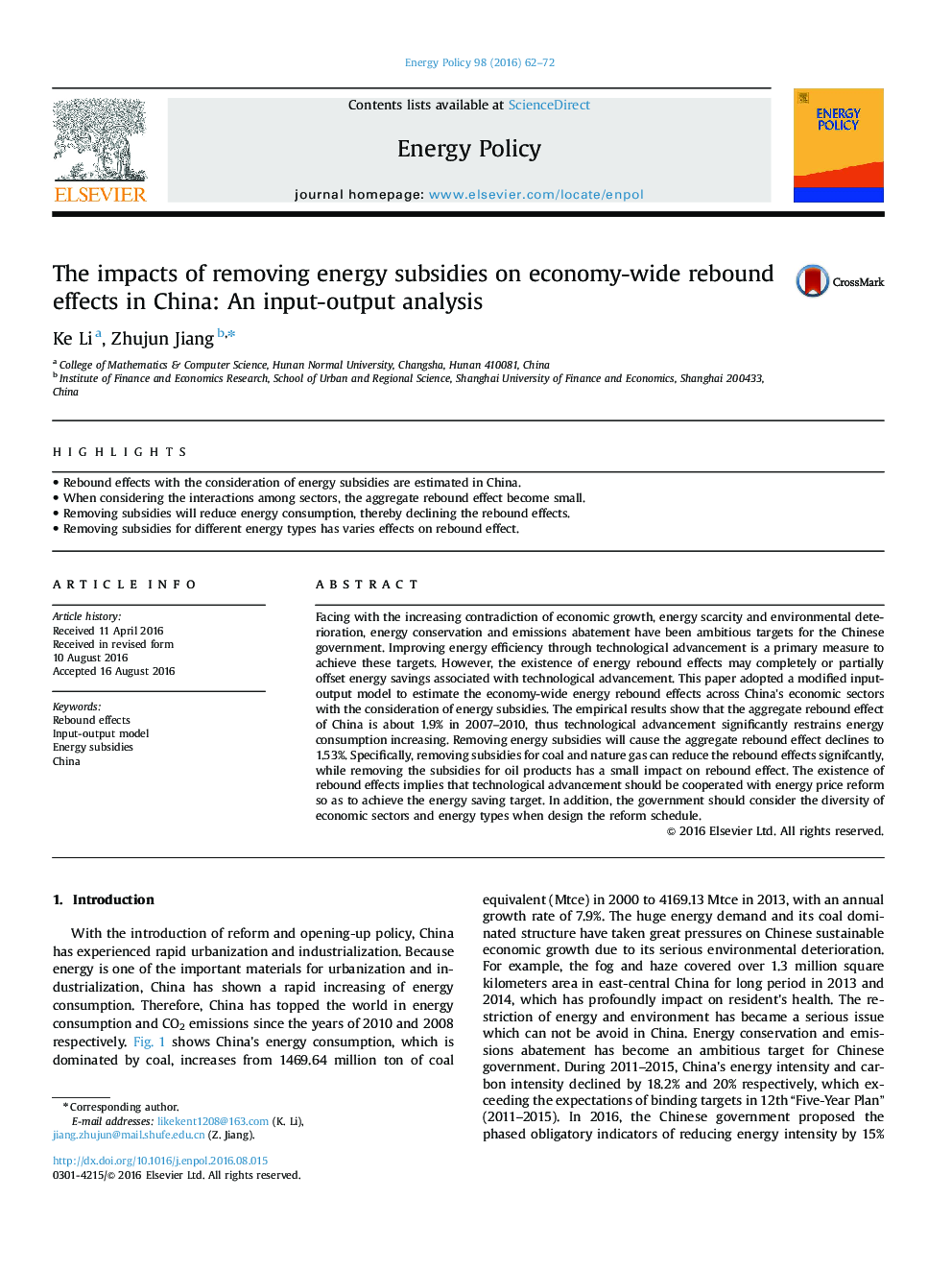| کد مقاله | کد نشریه | سال انتشار | مقاله انگلیسی | نسخه تمام متن |
|---|---|---|---|---|
| 7398630 | 1481260 | 2016 | 11 صفحه PDF | دانلود رایگان |
عنوان انگلیسی مقاله ISI
The impacts of removing energy subsidies on economy-wide rebound effects in China: An input-output analysis
ترجمه فارسی عنوان
اثرات حذف یارانه های انرژی بر اثرات برگشت اقتصادی در چین: تجزیه و تحلیل ورودی / خروجی
دانلود مقاله + سفارش ترجمه
دانلود مقاله ISI انگلیسی
رایگان برای ایرانیان
کلمات کلیدی
اثرات بازگشتی، مدل ورودی-خروجی، یارانه های انرژی، چین،
ترجمه چکیده
در مواجهه با تشدید تشدید رشد اقتصادی، کمبود انرژی و کاهش زیست محیطی، کاهش مصرف انرژی و کاهش انتشار گازهای گلخانه ای، اهداف بلندپروازانه برای دولت چین بوده است. بهبود بهره وری انرژی از طریق پیشرفت تکنولوژی یک اقدام اولیه برای دستیابی به این اهداف است. با این حال، وجود اثرات بازگشت انرژی می تواند به طور کامل یا بخشی از صرفه جویی انرژی در ارتباط با پیشرفت تکنولوژیکی را جبران کند. این مقاله یک مدل ورودی-خروجی اصلاح شده برای ارزیابی اثرات بازتاب انرژی در بخش های اقتصادی چین با توجه به یارانه های انرژی به تصویب رساند. نتایج تجربی نشان می دهد که اثر بازتوزیع کلی چین در سالهای 2007-2010 حدود 1.9 درصد است، بنابراین پیشرفت تکنولوژیکی به طور قابل توجهی مانع افزایش مصرف انرژی می شود. از بین بردن یارانه های انرژی باعث کاهش بازده کلی به 1.53٪ می شود. به طور خاص، حذف یارانه ها برای گاز زغال سنگ و گاز طبیعی می تواند اثرات بازگشتی را به میزان قابل توجهی کاهش دهد، در حالیکه حذف یارانه ها برای محصولات نفتی اثر کمی بر بازده دارد. وجود اثرات بازگشتی نشان می دهد که پیشرفت تکنولوژی باید با اصلاح قیمت انرژی همکاری کند تا هدف صرفه جویی در انرژی به دست آید. علاوه بر این، دولت باید تنوع بخش های اقتصادی و انواع انرژی را در هنگام برنامه ریزی اصلاحات مورد توجه قرار دهد.
موضوعات مرتبط
مهندسی و علوم پایه
مهندسی انرژی
مهندسی انرژی و فناوری های برق
چکیده انگلیسی
Facing with the increasing contradiction of economic growth, energy scarcity and environmental deterioration, energy conservation and emissions abatement have been ambitious targets for the Chinese government. Improving energy efficiency through technological advancement is a primary measure to achieve these targets. However, the existence of energy rebound effects may completely or partially offset energy savings associated with technological advancement. This paper adopted a modified input-output model to estimate the economy-wide energy rebound effects across China's economic sectors with the consideration of energy subsidies. The empirical results show that the aggregate rebound effect of China is about 1.9% in 2007-2010, thus technological advancement significantly restrains energy consumption increasing. Removing energy subsidies will cause the aggregate rebound effect declines to 1.53%. Specifically, removing subsidies for coal and nature gas can reduce the rebound effects signifcantly, while removing the subsidies for oil products has a small impact on rebound effect. The existence of rebound effects implies that technological advancement should be cooperated with energy price reform so as to achieve the energy saving target. In addition, the government should consider the diversity of economic sectors and energy types when design the reform schedule.
ناشر
Database: Elsevier - ScienceDirect (ساینس دایرکت)
Journal: Energy Policy - Volume 98, November 2016, Pages 62-72
Journal: Energy Policy - Volume 98, November 2016, Pages 62-72
نویسندگان
Ke Li, Zhujun Jiang,
